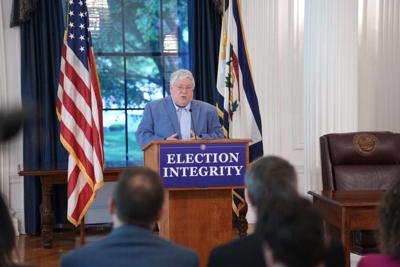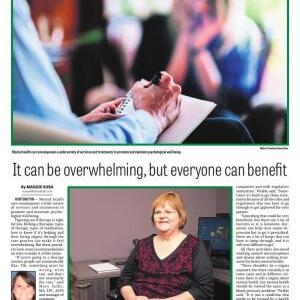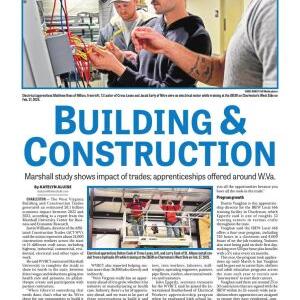While Wednesday marked the deadline for Gov. Patrick Morrisey to officially sign bills passed this legislative session into law, the governor held a ceremonial bill signing at the state capitol Thursday morning for legislation requiring photo identification for anyone voting in West Virginia.
, meant to address voter fraud and bolster secure elections, would require a photo ID ����ֱ��� typically a driver����ֱ���s license, passport or a resident identification card ����ֱ��� to vote in-person.
It eliminated several options previously accepted at polling places to validate identity, including a Medicaid card and utility bill, among others.
Citizens can request a voter registration card with a photograph from either their county clerk or the Secretary of State, per the code, however the process for doing so is not specified in the bill text. Any cards requested will be given free of charge. No funds were allocated through this bill for the creation or distribution of such cards.
Anyone who is unable to provide a valid photo ID at the ballot box will still be able to cast a provisional ballot after signing an affidavit confirming their identity. Once election officials verify their identity, the provisional ballot should be counted as long as the person is an eligible voter.
In comments Thursday, Morrisey and other legislative leaders acknowledged that voter fraud is not widespread in West Virginia, but alleged that making HB 3016 into law will ensure that remains true.
Nationwide, however, that photo ID requirements for voting can restrict ballot box access for millions of people ����ֱ��� namely older people, low-income residents and already marginalized groups. There is little evidence showing that such laws limit voter fraud, which is incredibly rare.
West Virginia already has . Opponents of HB 3016 during session that the bill will make it difficult ����ֱ��� particularly for older West Virginians and those who don����ֱ���t drive or lack access to the internet ����ֱ��� to vote in the state.
The legislation was one of several priorities listed by Secretary of State Kris Warner before the beginning of the 2025 session. On Thursday, Morrisey called the measure ����ֱ���commonsense.����ֱ���
����ֱ���Democratic elections are only as strong as the trust placed in them by the voters,����ֱ��� Morrisey said ����ֱ���This commonsense legislation secures West Virginia����ֱ���s elections and instills faith in the voting process.����ֱ���
Morrisey signed DEI ban, bill requiring teachers to out students����ֱ��� gender to parents
As Wednesday����ֱ���s deadline for gubernatorial action came to a close, Gov. Morrisey signed several bills into law ����ֱ��� including one to ban nearly all diversity, equity and inclusion initiatives in the state. was a priority for Morrisey. The bill bans the offering of specific services or opportunities to people based on their race, color, ethnicity, country of origin and, , sex. It applies to DEI policies and initiatives in state and local governments and schools, including institutions of higher education.
On the final night of session, . Lawmakers in the House introduced and considered dozens of amendments that evening ����ֱ��� mostly from Democrats ����ֱ��� to slow the bill����ֱ���s progress.
After nearly three hours of debate, the bill passed the House with one member absent.
When SB 474 was returned to the Senate for consideration with less than two hours remaining before sine die, Sen. Joey Garcia, D-Marion, had a similar plan.
Garcia filed 13 amendments that were to be considered on the bill before lawmakers voted on it. However, what he called ����ֱ���dirty tricks����ֱ��� prevailed as Sen. Eric Tarr, R-Putnam, called for a rare suspension of Joint Rule 3, which stopped Garcia����ֱ���s amendments from being taken up. Garcia and Sen. Mike Woelfel, D-Cabell, had their microphones silenced on the floor and the rest of the chamber ����ֱ��� all Republicans ����ֱ��� passed the bill without any discussion.
Garcia questioned the legitimacy of the bill����ֱ���s passage. Now, with the bill signed into law, someone would need to challenge its standing in court to prove him right or wrong.
Despite the bill being a priority for Morrisey and introduced at his request, he signed the bill into law quietly on Wednesday night.
That evening, he also signed , a bill when a child requests to be referred to by a different name or pronouns that are different from the student����ֱ���s biological sex. The bill also permits parents who aren����ֱ���t alerted about their child����ֱ���s gender-related requests to bring legal action against the public school.
The bill was sponsored by Sen. Amy Grady, R-Mason, a public school teacher who sponsored an identical measure last year. Other Republicans who defended the measure said that parents����ֱ��� rights should always come before a child����ֱ���s privacy or educators����ֱ��� concerns.
Fairness WV opposes the education measure. Andrew Scheider, executive director of the LGBTQ civil rights organization, told West Virginia Watch it would force teachers to out their students even if they have reason to believe doing so would result in students being abused at home.
����ֱ���In cases like these, a teacher would be faced with choosing between following this new law or putting their student����ֱ���s life at risk,����ֱ��� he said.
Bills vetoed by Morrisey
Out of the total 249 bills passed this legislative session, Morrisey vetoed just six. In just before midnight on Wednesday, Morrisey said those vetoes were ����ֱ���due to unfunded mandates, questionable policy, or fiscal concerns.
Vetoed bills include:
- , which would have promulgated legislative rules for multiple agencies and boards. In his
- , Morrisey voiced concerns with some inconsistencies in the legislation as well as technical issues. Substance wise, Morrisey said he disagreed with parts of the bill that would have changed regulatory processes for political action committees in the state. While his concerns laid with only parts of the legislation, he urged lawmakers to ����ֱ���expeditiously work to modify and fix the technical flaws����ֱ��� he listed.
- , which would have limited members of the state Board of Education from serving in other political roles while holding a seat on the board. The bill would have banned sitting school board members from becoming a candidate for any other public office, serving as a delegate to a national political party convention or soliciting or receiving campaign contributions for any candidate for partisan office.
- he disagreed with such limits, as running for office is a ����ֱ���fundamental right����ֱ��� and efforts to limit that were ����ֱ���constitutionally concerning.����ֱ���
- , which would have levied specific misdemeanor charges and fines against anyone who assaulted an athletic official or athlete in the state.
- that while he finds such offenses ����ֱ���abhorrent,����ֱ��� he ����ֱ���cannot justify a crime against a referee carrying a minimum sentence that is double that for assault on a police officer.����ֱ��� He urged lawmakers to work with his office to ����ֱ���craft better legislation.����ֱ���
- , which would have created the West Virginia Short Line Railroad Modernization Act by levying tax credits for short line rail companies in the state.
- the state ����ֱ���cannot afford����ֱ��� the bill and voiced concerns regarding its approach to tax reform generally.
- , which would have made changes to the makeup of the state����ֱ���s Ethics Commission and added new requirements to comply with its standards.
- his veto came at the request of the Ethics Commission. Members there, he said, voiced concerns that the changes would place ����ֱ���considerable strain����ֱ��� on the Commission����ֱ���s already ����ֱ���tight����ֱ��� budget and make it more difficult to find individuals willing to serve on it.
- , which would have increased the hourly compensation rate for panel attorneys in the state. The rates proposed would have increased pay from from $60 to $70 for out-of-court work, and from $80 to $90 for in-court work.
- he was ����ֱ���sympathetic����ֱ��� about the intent of the bill, however making it law would have created a ����ֱ���shortfall in appropriations without any identified offsets.����ֱ��� Since the Legislature decreased funding for public defenders in the budget passed this session, Morrisey said, a veto was necessary since ����ֱ���the math does not add up.����ֱ���













